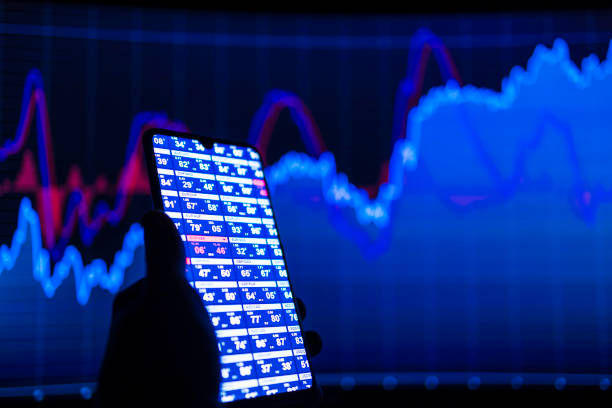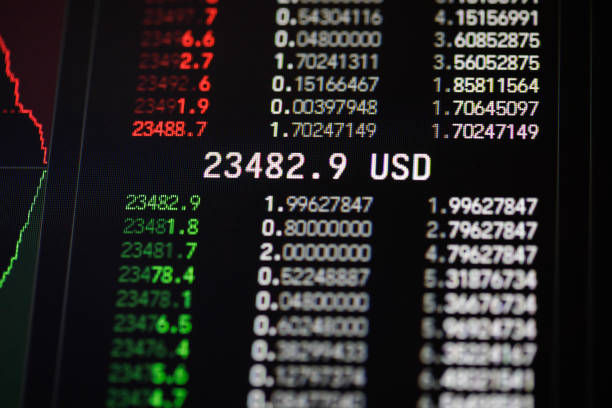Forex Trading Platforms:
- The Moolah Team
- Jul 2, 2023
- 11 min read
Forex trading platforms are software tools that allow investors to trade currencies in the foreign exchange market.
I. Introduction: Understanding Forex Trading Platforms
The foreign exchange market is a dynamic and ever-changing market, with trillions of dollars traded every day. For investors who want to capitalize on fluctuations in the value of different currencies, forex trading is an attractive option. However, to succeed in forex trading, investors need a reliable and user-friendly trading platform.
Forex trading platforms are software tools that allow investors to trade currencies in the foreign exchange market. These platforms connect investors with forex brokers and provide them with access to real-time currency prices, charts, and analysis tools. They also enable investors to place trades, manage their accounts, and monitor their performance.
In this blog post, we will explore the features and benefits of forex trading platforms, as well as some of the top platforms available in the market today. But before we dive into the details, let's take a closer look at what forex trading platforms are and how they work.
A. Definition and Functionality
Forex trading platforms are software tools designed to help investors trade currencies in the foreign exchange market. They provide a range of features and tools to help investors analyse the market, manage their trades, and monitor their performance. These platforms are typically provided by forex brokers, who act as intermediaries between investors and the market.
Forex trading platforms offer investors access to real-time market data, including prices, charts, and news. They also provide advanced charting tools, customizable layouts, news feeds, economic calendars, and trading signals. These features enable investors to make informed trading decisions based on the latest market trends and developments.
B. Types of Forex Trading Platforms
There are several types of forex trading platforms available in the market today. The most common types are desktop platforms, web-based platforms, and mobile platforms.
Desktop platforms are downloaded and installed on a computer. They offer advanced charting tools, customizable layouts, and access to a range of trading instruments. Desktop platforms are ideal for investors who want a powerful trading platform with advanced features.
Web-based platforms run on a web browser and require no download or installation. They offer many of the same features as desktop platforms, including advanced charting tools, customizable layouts, and access to a range of trading instruments. Web-based platforms are ideal for investors who want a flexible trading platform that can be accessed from anywhere with an internet connection.
Mobile platforms are designed for use on smartphones and tablets. They offer many of the same features as desktop and web-based platforms, including advanced charting tools, customizable layouts, and access to a range of trading instruments. Mobile platforms are ideal for investors who want to trade on the go and stay connected to the market at all times.
C. Key Features of Forex Trading Platforms
Forex trading platforms offer a range of features to help investors analyse the market, manage their trades, and monitor their performance.
Some of the key features include:
Real-time price quotes:
Forex trading platforms provide investors with access to real-time market data, including prices, charts, and news.
Advanced charting tools:
Forex trading platforms offer advanced charting tools to help investors analyse market trends and identify potential trading opportunities.
Customizable layouts:
Forex trading platforms allow investors to customize the layout of their trading screens to suit their preferences.
News feeds:
Forex trading platforms provide access to real-time news and economic data, allowing investors to stay informed about market developments.
Economic calendars:
Forex trading platforms offer economic calendars that list upcoming events and data releases that may impact the market.
Trading signals:
Forex trading platforms provide trading signals that alert investors to potential trading opportunities based on technical analysis.
In conclusion, forex trading platforms are essential tools for investors who want to trade currencies in the foreign exchange market. They offer a range of features and benefits that enable investors to make informed trading decisions and stay connected to the market at all times.

II. Features and Benefits of Forex Trading Platforms
Forex trading platforms offer a range of features and benefits to investors who want to trade currencies in the foreign exchange market. These platforms are designed to provide investors with access to real-time market data, advanced analysis tools, and customizable trading screens. In this section, we will explore some of the key features and benefits of forex trading platforms.
A. Real-time Market Data
One of the most important features of forex trading platforms is access to real-time market data. This data includes prices, charts, news, and economic indicators. Real-time market data is essential for investors who want to make informed trading decisions based on the latest market trends and developments.
Forex trading platforms provide investors with access to real-time price quotes for different currency pairs. These price quotes are updated in real-time and allow investors to monitor the market closely. Forex trading platforms also offer advanced charting tools that enable investors to analyse market trends and identify potential trading opportunities.
B. Advanced Analysis Tools
Forex trading platforms offer a range of advanced analysis tools that help investors make informed trading decisions. These tools include technical analysis tools, such as moving averages, Bollinger Bands, and Fibonacci retracements. They also include fundamental analysis tools, such as economic calendars, news feeds, and market sentiment indicators.
Technical analysis tools are used to analyse price trends and identify potential trading opportunities. They are based on mathematical algorithms that analyse historical price data and identify patterns that can be used to predict future price movements. Fundamental analysis tools, on the other hand, are used to analyse economic data, news releases, and other market developments that may impact currency prices.
C. Customizable Trading Screens
Forex trading platforms offer customizable trading screens that allow investors to tailor their trading experience to their preferences. These screens can be customized to display the information that investors consider most important, such as real-time price quotes, charts, news feeds, and economic calendars.
Customizable trading screens also enable investors to organize their trading activities in a way that makes sense to them. They can create watchlists of their favourite currency pairs, set up alerts for specific price movements, and place trades directly from their trading screens.
D. Multiple Trading Instruments
Forex trading platforms offer access to a range of trading instruments, including currency pairs, commodities, indices, and cryptocurrencies. This enables investors to diversify their trading portfolios and take advantage of different market conditions.
Currency pairs are the most commonly traded instruments in the forex market. They are traded in pairs, with one currency representing the base currency and the other currency representing the quote currency. Commodities, such as gold, oil, and silver, are also traded in the forex market, as are indices, such as the Dow Jones Industrial Average and the S&P 500. Cryptocurrencies, such as Bitcoin and Ethereum, are also gaining popularity as trading instruments in the forex market.
E. User-friendly Interface
Forex trading platforms are designed to be user-friendly and easy to navigate. They provide investors with a range of tools and features, but they are also intuitive and easy to use. This is important for investors who may not have extensive experience with trading or who may be new to the forex market.
Forex trading platforms offer tutorials, webinars, and other educational resources to help investors get started with trading. They also provide customer support services to assist investors with any questions or issues they may encounter.
In conclusion, forex trading platforms offer a range of features and benefits that make them essential tools for investors who want to trade currencies in the foreign exchange market. These platforms provide investors with access to real-time market data, advanced analysis tools, customizable trading screens, multiple trading instruments, and user-friendly interfaces.

III. How Forex Trading Platforms Work
Forex trading platforms are designed to make it easy for investors to trade currencies in the foreign exchange market. They work by connecting traders with the interbank market, where they can buy and sell currencies directly with other market participants.
A forex trading platform acts as a mediator between the trader and the interbank market. The platform provides the trader with real-time price quotes for different currency pairs, and the trader can use these quotes to make trades. When a trade is executed, the platform will automatically match the trader's order with an opposite order from another market participant. This is known as a "matching engine," and it ensures that the trader's orders are always filled at the best available price.
Forex trading platforms also provide a range of other features and tools to help traders make informed decisions. These may include charting tools, technical indicators, news feeds, economic calendars, and more. The platform may also provide access to educational resources, such as webinars and tutorials, to help traders learn about the markets and improve their trading skills.
One key feature of forex trading platforms is the ability to place orders. There are several different types of orders that traders can use to execute trades. These include market orders, limit orders, stop-loss orders, and more. Each type of order has its own advantages and disadvantages, and traders will need to decide which type of order is best suited to their trading strategy.
Another important feature of forex trading platforms is risk management. Trading in the foreign exchange market can be risky, and traders need to be able to manage their risk effectively. Forex trading platforms may offer a range of risk management tools, such as stop-loss orders, which automatically close a trade if it reaches a certain level of loss. Traders may also be able to set up alerts and notifications to keep them informed of market movements and potential risks.
Overall, forex trading platforms are essential tools for anyone looking to trade currencies in the foreign exchange market. They provide a range of features and tools to help traders make informed decisions and manage their risk effectively. By using a forex trading platform, traders can access the interbank market and take advantage of the opportunities presented by the constantly changing global currency markets.

IV. Choosing a Forex Trading Platform
Choosing the right forex trading platform is an important decision for anyone looking to trade currencies in the foreign exchange market. With so many different platforms available, it can be difficult to know where to start. In this section, we will explore some key factors to consider when choosing a forex trading platform.
A. Security
Security should be a top priority when choosing a forex trading platform. You want to ensure that your personal and financial information is protected at all times. Look for a platform that uses strong encryption to protect your data, and that has a good reputation for security.
B. Regulation
Another important factor to consider is regulation. Look for a platform that is regulated by a reputable financial authority, such as the Financial Conduct Authority (FCA) in the UK, or the National Futures Association (NFA) in the US. Regulation helps to ensure that the platform operates in a fair and transparent manner, and that your funds are protected.
C. User Interface
The user interface of the platform is also important. Look for a platform that is easy to use and navigate, with a clean and intuitive interface. This will make it easier for you to find the tools and features you need to make informed trading decisions.
D. Trading Tools and Features
Forex trading platforms offer a range of tools and features to help traders make informed decisions. Look for a platform that offers a range of charting tools, technical indicators, news feeds, economic calendars, and more. The platform should also provide access to educational resources, such as webinars and tutorials, to help traders learn about the markets and improve their trading skills.
E. Order Types
The platform should also offer a range of order types to suit different trading strategies. Look for a platform that offers market orders, limit orders, stop-loss orders, and more. Each type of order has its own advantages and disadvantages, and traders will need to decide which type of order is best suited to their trading style.
F. Customer Support
Good customer support is essential when using a forex trading platform. Look for a platform that offers 24/7 support, with multiple channels of communication, such as email, phone, and live chat. The platform should also have a good reputation for customer service.
G. Demo Account
Finally, consider whether the platform offers a demo account. A demo account allows you to test the platform and practice trading without risking any real money. This can be a useful way to get familiar with the platform and test your trading strategies before committing to a live account.
In conclusion, choosing the right forex trading platform is essential for anyone looking to trade currencies in the foreign exchange market. Consider factors such as security, regulation, user interface, trading tools and features, order types, customer support, and demo accounts when making your decision. By doing your research and choosing the right platform for your needs, you can increase your chances of success as a forex trader.

V. Risks and Challenges of Forex Trading
While forex trading can be a lucrative opportunity, it is important to understand the risks and challenges involved. In this section, we will explore some of the key risks and challenges of forex trading.
A. Volatility
The forex market is highly volatile, meaning that prices can fluctuate rapidly and unpredictably. This can make it difficult to predict market movements and can result in significant losses for traders. It is important to understand the risks associated with volatile markets and to have a sound trading strategy in place to manage risk.
B. Leverage
Forex trading often involves the use of leverage, which allows traders to control a large amount of currency with a small investment. While leverage can amplify profits, it can also amplify losses. Traders should be aware of the risks associated with leverage and should only use it if they fully understand how it works.
C. Liquidity
While the forex market is the largest financial market in the world, it can still experience periods of low liquidity. This can make it difficult to execute trades at the desired price, and can result in slippage or other execution issues. Traders should be aware of the risks associated with low liquidity and should adjust their trading strategies accordingly.
D. Political and Economic Events
The forex market is heavily influenced by political and economic events, both domestically and internationally. These events can have a significant impact on currency prices and can result in sudden and unexpected market movements. Traders should be aware of the risks associated with political and economic events and should keep up-to-date with news and developments that may affect the market.
E. Psychological Challenges
Forex trading can also be psychologically challenging. Traders may experience emotions such as fear, greed, and overconfidence, which can lead to irrational decision-making and result in losses. It is important to develop a sound trading psychology and to stick to a trading plan to avoid making emotional decisions.
F. Scams and Fraud
Unfortunately, the forex market is also susceptible to scams and fraud. Traders should be aware of the risks associated with scams and should do their research before investing with a broker or trading platform. Look for a platform that is regulated and has a good reputation for security and customer service.
In conclusion, forex trading can be a lucrative opportunity for investors, but it is important to understand the risks and challenges involved. Factors such as volatility, leverage, liquidity, political and economic events, psychological challenges, and scams and fraud should be considered when trading forex. By understanding these risks and developing a sound trading strategy, traders can increase their chances of success in the forex market.

VI. Conclusion: Is Forex Trading Right for You?
Forex trading can be a lucrative and exciting opportunity for investors, but it is not for everyone. Before deciding to trade forex, it is important to consider your personal financial goals and risk tolerance.
If you are interested in forex trading, the first step is to educate yourself about the market and the various trading strategies. There are many resources available online, including educational materials and trading forums where you can connect with other traders and learn from their experiences.
When choosing a forex broker or trading platform, it is important to do your research and choose a reputable provider. Look for a platform that is regulated by a reputable authority and has a good reputation for security and customer service.
Once you have chosen a platform and developed a trading strategy, it is important to practice your trading skills before investing real money. Many platforms offer demo accounts that allow you to trade with virtual currency, giving you the opportunity to practice your strategy and gain experience without risking real money.
If you do decide to trade forex, it is important to manage your risk carefully. This means setting stop-loss orders to limit your potential losses, using leverage wisely, and having a sound trading plan in place.
In conclusion, forex trading can be a rewarding opportunity for investors who are willing to put in the time and effort to learn about the market and develop a sound trading strategy. However, it is not for everyone, and it is important to carefully consider your personal financial goals and risk tolerance before deciding to trade forex. By educating yourself about the market, choosing a reputable platform, practicing your trading skills, and managing your risk carefully, you can increase your chances of success in the forex market.
Thanks for reading our in-depth exploration of forex trading platforms. We hope that this article has given you a better understanding of what forex trading platforms are, how they work, and what to look for when choosing a platform. If you enjoyed this post, don't forget to subscribe to our newsletter for more informative and engaging content. Thanks a million for your support!
Best regards,
Moolah







Comments